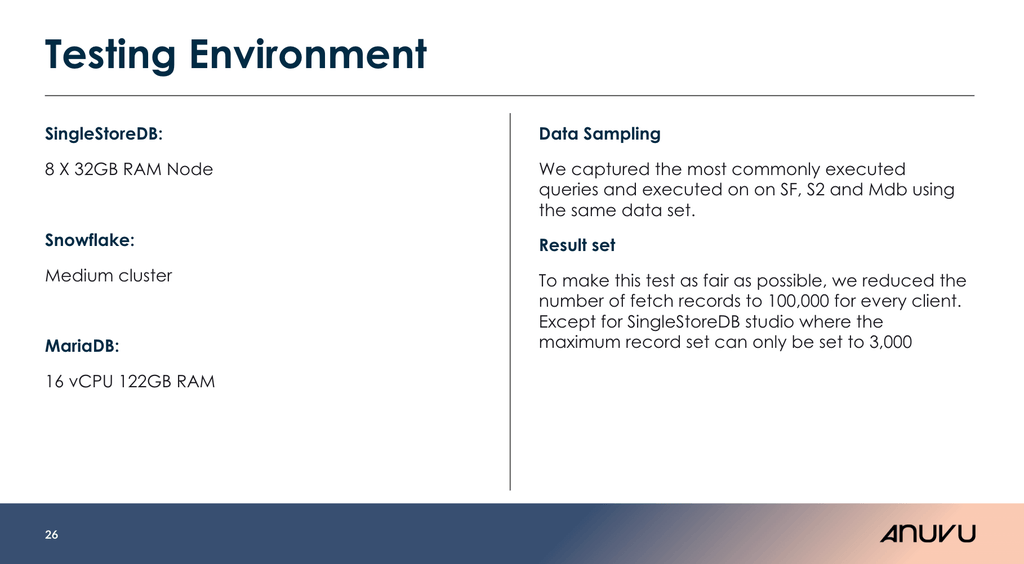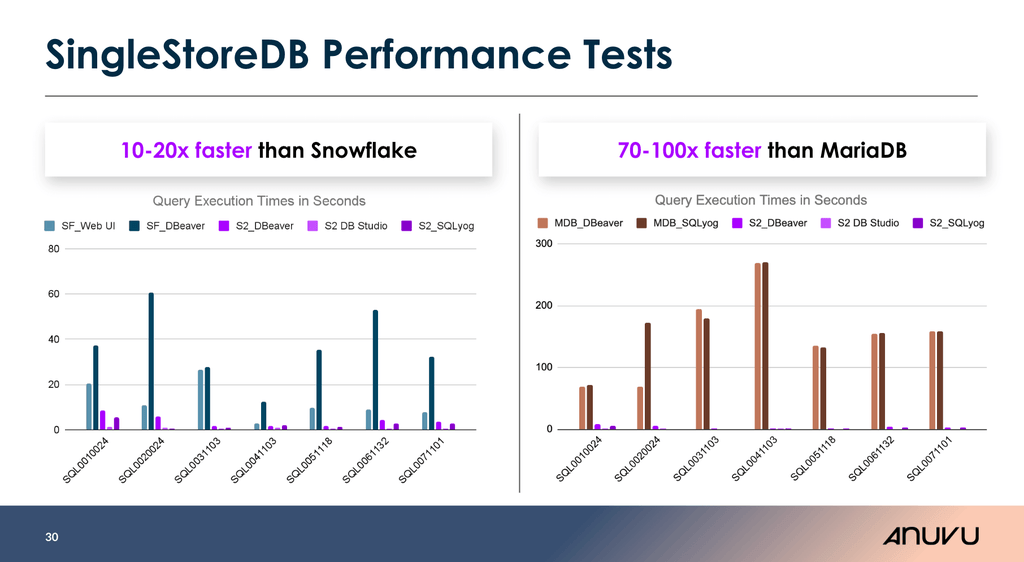
Anuvu, one of the leading global airline telecommunications providers, had a problem. They were struggling with a patchwork of redundant databases to power their applications and analytics.
Like several other organizations, they had multiple instances of MySQL, MariaDB and other analytical engines, like Snowflake and Redshift.
As a result, Anuvu struggled with operational complexity, data errors and inconsistencies, redundant processes, skyrocketing costs and lagging speed. The company took a long, hard look at their data infrastructure — and decided to take action in simplifying their solutions.
In our webinar, “Anuvu Speed Tests MariaDB, Snowflake & SingleStoreDB,” we dive deeper into Anuvu’s journey toward database modernization and consolidation, including how they cut TCO by 10x and saw a 20x increase in performance.
Here’s a look at what we discussed when we were joined by Orlando Jimenez, Senior Infrastructure Engineer at Anuvu.
The Anuvu Database Journey
Anuvu started building their tech stack with MySQL and MariaDB, initially choosing the open-source databases for their unlimited record storage, free community version and MyISAM benchmark performance. As Jimenez goes on to explain, one of Anuvu’s main analytics processes (done using Java), took 16 hours to compile one days’ worth of data.
In an effort to reduce this time, Anuvu decided to run analytics as a stored procedure — and saw the time it took to compile the data drop from 16 to 3 hours. After that, they made the decision to run all analytics inside the database, adding Snowflake and Redshift to their stack.
While this worked for Anuvu for some time, weaknesses eventually emerged. These included:
- Source data that didn’t write to all databases. Certain databases only received data generated for a specific client, which led to disparity between sources.
- Stored procedures started the same, but had to be updated based on specific client needs. These changes made each stored procedure unique — only making it more difficult to fix data errors.
- Table locks occurred with INSERT statements within MariaDB, leading to data availability issues.
Overall, these issues led to inconsistent datasets, asynchronous processes and poor performance that impacted customer experiences.
Searching for a Single Source of Truth
It became clear to the Anuvu team that disparate systems were no longer serving them well. “We needed a single database with all the processes and all the data — and then we can distribute and ensure the data is here, it’s correct and all the processes are right, “ says Jimenez.
To make this centralized model viable, Anuvu had a strict set of requirements that needed to be met. The database had to:
- Easily migrate 500+ stored procedures
- Store 500G+ tables, and outperform MySQL query capabilities
- Have analytical capabilities (columnstore)
- Easily scale as data grew, with available hard disk and memory
- Provide a single, unified data repository for fast response times
The company compiled a list, with Amazon Redshift, Snowflake and Hadoop as candidates. But in weighing the pros and cons of each, they were led to SingleStoreDB.
“We started playing with it, and found out it was fast,” says Jimenez. Additionally, Anuvu chose SingleStoreDB for its MySQL compatibility, rowstore engine and columnstore capabilities.
Database Race: Speed Testing SingleStoreDB, Snowflake and MariaDB
After seeing what SingleStoreDB was capable of, Anuvu kicked off speed testing. “We started serious testing to make sure that it was not a mirage that we were seeing — that the solution was actually viable,” says Jimenez.
Using an existing client's query needs, Anuvu set up the testing environment for SingleStoreDB, Snowflake and MariaDB.

As Anuvu saw from the results, SingleStoreDB was not too good to be true. In fact, it outperformed Snowflake and MariaDB so drastically, you might blink and miss it.
“Just check out the DB query times,” says Jimenez. “SingleStore was 10-20x faster than Snowflake, and 70-100x faster than MariaDB. It’s barely perceptible the amount of time that SingleStore took. It was so fast, it’s hard to even see SingleStore in the chart.”

The tests produced a clear winner. Today, SingleStoreDB is Anuvu’s primary database, empowering them to distribute data and insights to all of their clients accurately, and in real time.
This isn’t the first time SingleStoreDB has been benchmarked against — or outperformed — Snowflake. Check out the GigaOm Database Benchmark Report to see how SingleStoreDB stacks up against Snowflake, Amazon Redshift, MySQL and PostgreSQL.
See More From Anuvu: Watch the Webinar On Demand
“Anuvu Speed Tests MariaDB, Snowflake & SingleStoreDB'' is available on demand today. Get a closer look at Anuvu’s results, discover why SingleStoreDB meets all of their needs and find out how you can try SingleStoreDB free.





